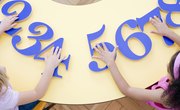Place value is crucial in identification and computation of problems in mathematics. Place value refers to the comprehension of the Hindu-Arabic base-ten number system. Children must understand what each digit represents and how to use this knowledge when solving problems. Students often have difficulty when applying this very complicated concept.
Mistakes
The mistakes children make when learning place value generally are of two types: errors and misconceptions. Errors are mistakes made due to lack of attention, working too fast, missing an important part of a problem or overtaxed memory. With these types of errors, students can usually identify their mistakes and correct them. These errors do not affect a student's overall progress in mathematics. Misconceptions, however, stem from a student's misunderstanding of the central concept. Misconceptions tend to be consistent; identifiable from mistakes made repeatedly in the course of a student's work.
Abstractness
Many young children have difficulty with place value because it is abstract. Young children are concrete learners, meaning they need sensory experiences to develop their learning. Using manipulatives, such as base-ten blocks, can help students connect the abstract with more concrete representations.
Real-World Connection
It is important to help children connect the concept of place value to the real world. Often, children do not see how mathematical concepts apply to their individual lives. Teachers can resolve this by giving real world examples when teaching place value. Manipulatives and coins are useful for achieving this connection.
Teacher Issues
Teachers may have difficulty teaching place value if they do not personally understand those concepts. In order to explain the concept to children in a manner that makes sense to them, teachers must have a thorough understanding of place value and the number system. Teachers may confuse students by giving them unnecessary information or presenting algorithms as logical processes.
Reversals
Children often reverse places within a number. For example, a child may identify "13" as "31." This misconception typically stems from the lack of understanding that 13 is equal to 10+3 and 31 is 30 +1. Students see numbers as meaningless, abstract entities that they manipulate through algorithms or processes that are equally meaningless. Their goal is to answer the problem correctly without understanding the elements or the answer. Teachers mistakenly reward this lack of understanding by praising children's completion of problems without any actual understanding of the meaning behind those problems.
Multidigit Numbers and Decimals
Most children can identify the place value of smaller numbers. However, in the upper elementary grades, students are exposed to ten thousands, hundred thousands, and millions. The commas may confuse students when recognizing numbers. Decimals and their place value cause great confusion, particularly if a student does not understand place value of whole numbers. Even in middle school and high school, students often have difficulty ordering decimals correctly.
Related Articles
References
- Education: The Impact of Place Value on Mathematics
- Center for Teaching and Learning of Mathematics: Place Value Concept: How Children Learn It and How to Teach It
- National Center for Excellence in the Teaching of Mathematics: Misconceptions, Partial Conceptions & Errors; Mistakes -- are they essential to learning?
- Garlikov: The Concept and Teaching of Place-Value
Writer Bio
Ashley Seehorn has been writing professionally since 2009. Her work has been featured on a variety of websites including: eHow, Answerbag and Opposing Views Cultures. She has been a teacher for 20 years and has taught all ages from preschool through college. She is currently working as a Special Education Teacher.











